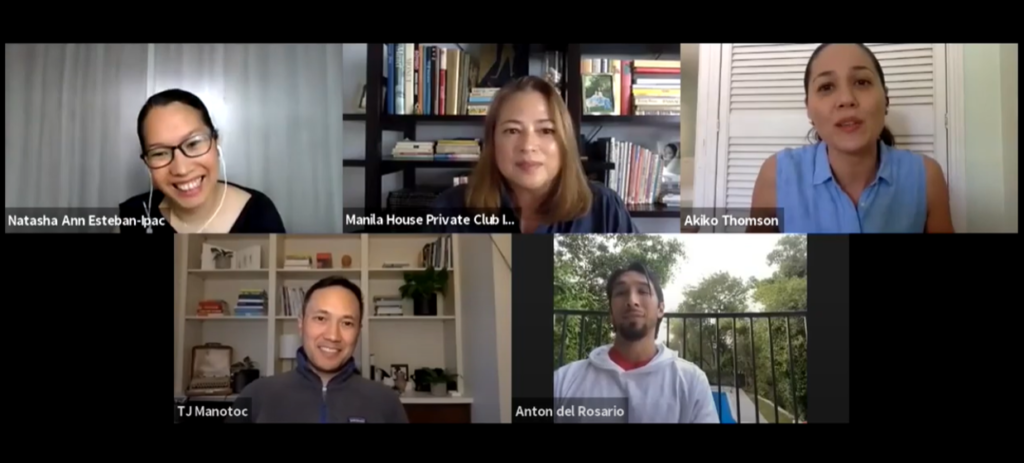You Trained for Your Sport — But are You Mentally Fit?
You Trained for Your Sport —
But are You Mentally Fit?
Joy Rojas
Manila House and CMI ask elite athletes, coaches, and mental health advocates the secrets to achieving a balance between body and mind
When elite athletes withdraw from competition, it is likely because of a physical injury incurred before or during their sport, one that impedes movement, thus preventing them from performing at their best.
But at the Tokyo 2020 Olympics, American athlete Simone Biles, the most decorated female gymnast in the sports’ history, stunned everyone when she announced she was bowing out of the team final and women’s individual all-around events, not for an injury, but to look after her mental health.
“I just felt like it would be a little bit better to take a back seat, work on my mindfulness,” she said in a press conference. “There is more to life than just gymnastics.”
Such honesty and vulnerability are rarely seen sides of athletes, particularly those perceived as invincible and unbeatable. Commenting on his chances of achieving the elusive Golden Slam—that is, winning Wimbledon, the Australian, French, and US Opens, and an Olympic gold medal all on the same year—World No. 1 tennis star Noval Djokovic, who already bagged this year’s Australian Open and Wimbledon men’s singles finals, said, “Pressure is a privilege, my friend…If you are aiming to be at the top of the game, you better start learning how to deal with pressure.”
The Serbian player would go on to eat his words. In his running for an Olympic bronze medal against Spain’s Pablo Carrera Busta, he had a major meltdown, hurling his racket into the stands at one point then smashing it onto the net in disgust. Djokovic would go home empty-handed, while Biles, who participated in the balance beam event, won a bronze. It is perhaps the most meaningful medal in her celebrated career. “This one is definitely sweeter,” says the multiple gold medalist. “I just did this for me and me only,” she said.
Such instances prove more and more how sports are as much a mental game as they are a physical one.
As a prelude to the Tokyo Olympics, Manila House Private Club, Inc., in partnership with Centre Medicale Internationale (CMI), presented the webinar “The Body Is Willing But The Spirit Resists: Mental Health And Sports.” Moderated by Manila House Director of Programming Bambina Olivares, the webinar explains through Olympic swimmer Akiko Thompson, football player Anton del Rosario, Alaska Aces assistant coach and former PBA star Tony dela Cruz, sports journalist and mental health advocate TJ Manotoc, and CMI adolescent medicine specialist Dr. Natasha Esteban-Ipac the relationship between the body and mind when it comes to sports, and how one can balance mental health with physical health to achieve the desired athletic performance.
“As a male athlete, you are always taught to be tough. Suck it up.”—Coach Tony dela Cruz, assistant coach for the Alaska Aces, former professional PBA player for Shell Turbo Chargers and Alaska Aces
For those that do not know me, I played 18 years [in the PBA] and I had a picture-perfect career: I was getting paid a lot of money. I was on good teams. I was actually the captain of the team that I was on.
But I did not understand how to process a lot of this stuff from the pressures of being an athlete. And it caught up with me. One day I got diagnosed with clinical depression during the heyday of my career.
As a basketball player, my self-worth was really tied to my performance. How much money am I making? How many points am I scoring? How many rebounds, how many minutes am I playing? How big is my contract? And when I did not perform at a high level, I tied that into “I am not of value to the organization.”
We need competition to bring out the best in people. But we also need to teach athletes, “It is okay to mess up. It is okay to fail. That is part of the learning process. It is not the end of the world.”
“We are human beings, we cannot help but notice what people are saying.”—Akiko Thompson, three-time Olympic swimmer, former secretary-general of the Philippine Amateur Swimming Association, former president of the Philippine Olympians Association, and former commissioner of the Philippine Sports Commission
There are different pressures that competitive athletes have to deal with, expectations, and through a series of competitions that progressively get more intense, you kind of learn how to deal with these pressures and expectations. But I think it is also the realization that there are many eyes watching you. Everything is magnified with social media.
Another aspect is when athletes transition out of the sport. When your whole life revolves around your sport, and when you transition out of sport, it can be very shocking to the system. There is a huge hole and gap! Is there anything else I am good at that I can do? [It was a] low period of my life, just trying to figure out, “What next?”
I am a very reflective person, and journaling is something that has always helped me process.
“It takes a toll on you playing at a certain level and devoting your life to a sport.”—Anton del Rosario, Fil-Am football player, owner-player of FC Maharlika, former Azkals Team member
Football was always my angle, my passion. It is what got me through everything. Sometimes it comes to a point where you kind of fall out of love with the game. And these are hardships that people outside of that whole team aura don’t really understand.
After my career, I was able to do what I love: create the 7’s Football League, took it across to six different cities across the country, expanding to Brunei as well, and looking to kick that off later on this year.
But COVID-19 hit, and all of a sudden, once again, no more football. I fell into a deep depression. I had no motivation and did not even want to pick up phone calls from people.
But, all of this is a part of life. As athletes, we look at it as just another obstacle. And we need to push past it. With that being said, I was able to reach out, talk with some people who got me onto the right way. And then all of a sudden, an opportunity comes around where we get to start a professional team that now represents in the top level here.
So I guess when it comes to mental health [it is all about] looking at the positive and at who is there around you to help you out of these things. And all of this ends up leading to trust in The Man Above. He is going to create that path and show you the way.
“It is very helpful to look to sports, to see where we can find that balance, where we can find mental wellness.”—TJ Manotoc, sportscaster and mental health advocate
Shortly after I came out with my video of what I went through as a teenager with depression and anxiety, one of the first big names that I saw in the news that came out about his struggles with depression and suicidal attempts was [Olympic swimmer] Michael Phelps. And you scratch your head and wonder, why did he dip into depression? What was it all about?
Fast forward to 2019. I was in a personal development event in LA and I met a guy. He was a Brazilian swimmer, he was at the top of his game, he was once the world champion—and he also almost committed suicide.
As elite athletes, they get to the pinnacle of success, and when it ends, they [ask] “What now?” because they had given so much of their life to that particular sport. And when it is taken away from you, when you reach your goals of gold medals, what is next?
And they suddenly felt the emptiness. As a sports journalist and an advocate for mental health, I found it so fascinating and enlightening to see that side of elite athletes, and how important it is for them now to tell their story, to give it back to the youth who are getting into sports, who want to be elite athletes. They are learning so much more now, how they can prevent burnout, how they can find that balance.
This is a trend that we can continue to share the stories. We can amplify their messages; we can help save lives. And I am sure we can help touch many, many lives as we continue to have discussions.
What can athletes do? Here are five tips from Dr. Natasha Esteban-Ipac, CMI’s Adolescent Medicine Specialist:
Validate your vulnerability. According to Dr. Esteban-Ipac, athletes do not seek support for their mental struggles “because exposing weakness can make them lose their contracts, financial gains, whatever it is they enjoy doing, or even their own identity. But admitting weakness is also a form of mental toughness.”
That said, be honest with yourself if you or anyone you know is exhibiting the following red flags. “Are you showing signs of withdrawal, agitation, low energy, changes in sleeping or eating patterns, weight gain or weight loss, or expressions of hopelessness and even violence?” asks Dr. Esteban-Ipac. “If you notice something off, just ask for help and help us.”
De-stigmatize mental illness. “It is okay not to be okay,” says Dr. Esteban-Ipac. “It is normal not to feel our best all the time. Athletes just need to be reassured that we know what they are going through and that there is something that can be done about it.”
Have a good support system. Fans love a winner, but one wrong move—multiple missed free throws in a championship match, or bagging the silver medal instead of the gold—can turn you from Most Valuable Player to Most Despised Player.
Surround yourself with people you trust—family, friends, coaches, and sports psychologists—who can put things in perspective and remind you that you did your best.
“Mental health is everyone’s business,” says Dr. Esteban-Ipac. “In solving the mental health concerns of our athletes, or even the general public, we have to have a holistic and multidisciplinary team. It is not just the responsibility of the health care provider, but it is everyone’s responsibility.”
Help yourself. Finding outlets outside your sport allows you to express thoughts and feelings, focus on other interests, or simply cope with stress. British diver and Olympic gold medalist Tom Daley attributes knitting to keeping him sane during the pandemic. The hobby has earned him more fans, especially after he knitted a pouch for his gold medal from the men’s synchronized 10-meter platform event.
Remember: You are more than the sport your play. That is a tough pill to swallow, especially for those who devote their entire lives training for and competing in that one sport—and do not know how to do anything else. But it is a reality that needs to be acknowledged early, especially when an athlete starts young. A sport may be a big part of an athlete’s life, but it does not define his self-worth as a human being.
“That is why we really need to help them understand that they are more than the sport they are playing, and that sports is not all that there is to life.”
At CMI, mental health is as much a priority as physical wellbeing. CMI’s mental health specialists are available for consultation by phone, by video, or in person. Call today at 0927 931 7194 or email experience@cminternationale.com.






